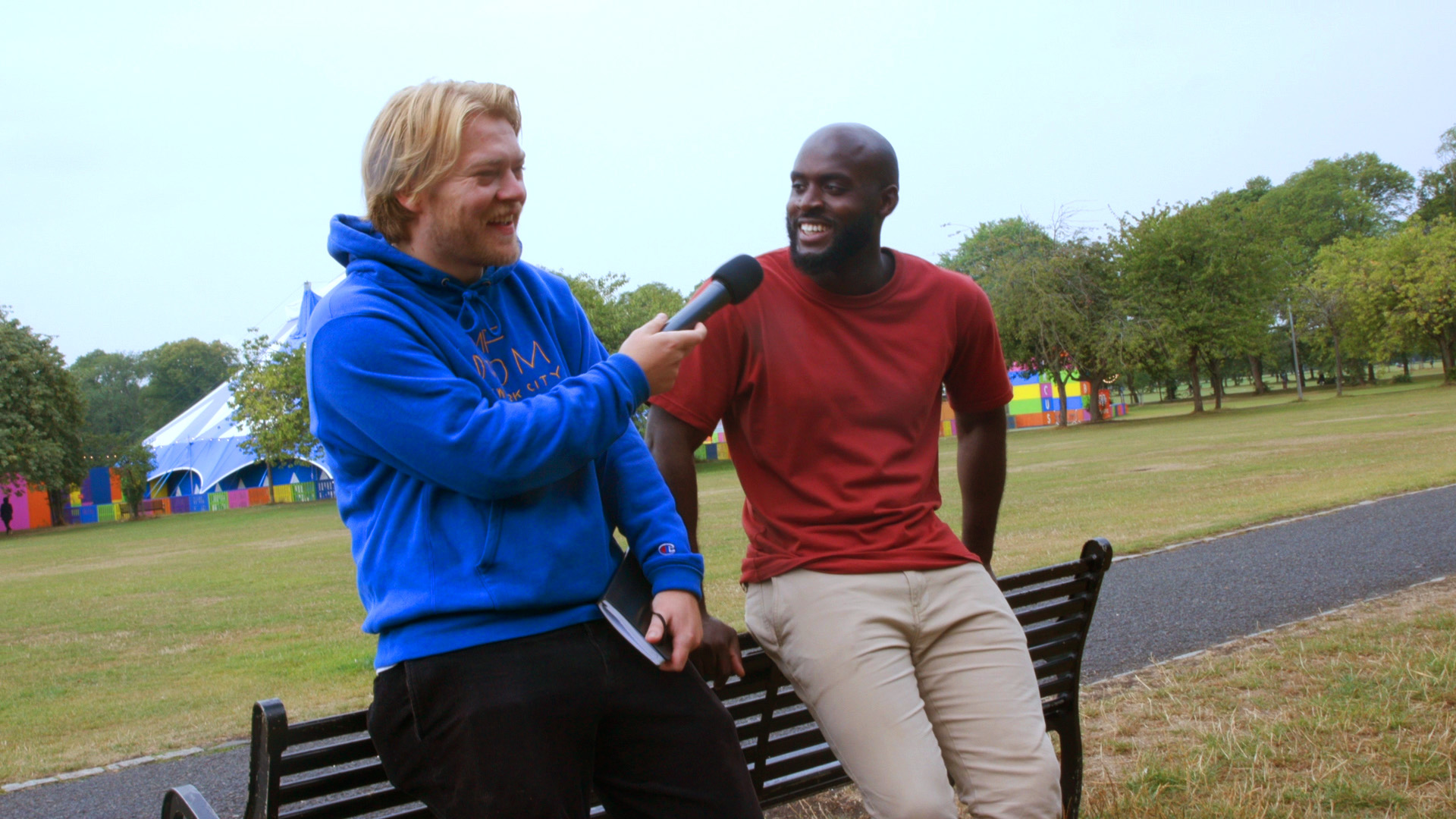
I meet Michael Akadiri during the middle of a little sell out run. His Fringe show, No Scrubs, has seen seven fully booked nights in a row, with the next three days already at capacity as well. Performing in the ‘Cellar’ at the Pleasance Courtyard, this is Akadiri’s first full Fringe. So far, it seems, so good.
I had the opportunity to go and watch No Scrubs myself the night before our coffee date. The performer on stage and the man opposite me in Starbucks the next morning appear remarkably similar – not because he’s trying to put on an act now, but because he seems so natural in front of a crowd. However personal, stand up comedy is always part acting, but Akadiri’s brand seems more casual than most. You certainly wouldn’t know that he only started doing stand up in 2017. Nor would you know this was his first time doing a month-long run at the Fringe. He’s funny and it comes through in conversation as well as comedy.

But performing is only one part of Akadiri’s life and, for most of the year, has to play second fiddle to the rigours of being a junior doctor. He is not the first medical practitioner turned funnyman, yet the last three or so years has seen unique questions posed of both the National Health Service and the world of comedy. Some of these challenges are discussed in No Scrubs, a show that relies on Akadiri’s personality and charisma.
Hear about it, and more, in our full interview below.
What new challenges has this extended run of solo shows at the Fringe brought?
“It’s stretching your material and trying to put a narrative to it, trying to have a message behind it, because people love that at the Fringe. It can’t just be funny. It’s about what you’re trying to say. What’s the underlying tone? So, I put a bit of that in it, but largely, I want people to have fun. It’s a comedy show. It needs to be funny first and then, if I can find a message and tell it in a humorous way, I’ll deliver it and hopefully people leave thinking “That was fun,” rather than, “Oh, he just lectured at me about yada, yada, yada.
“I probably performed a work in progress – or in whatever format it was – of [No Scrubs] about 35/40 times before bringing it to the Fringe. There’s a circuit that people do en route to Edinburgh: Brighton; I want to shout out Hastings Comedy Festival; I had a good time in Buxton; I did Bedford beforehand as well. Because now you have to come to Edinburgh with the show ready. Viewers and the industry come here and they want to see the finished product.”
And what about the financial commitment of the Fringe nowadays?
“It’s not cheap, and because of the cost, not everyone that probably could be here, is here. That just means you don’t get the true variety of voices that you may want from a Fringe, which is problematic. I’m fortunate with the job I do, I can sort of subsidise it a bit and I’ve been able to do a little bit of TV work before, which has helped contribute to the cost, but not everyone is in that same sort of position.”
Do you feel any pressure to talk about more serious topics in your comedy?
“It’s an interesting one. Like I say, when I started comedy, I went into it to be funny. My first thought was to make people laugh and as I’ve gotten a bit better, and done it a bit more, I’ve learnt there are ways you can still be funny, but still maybe try to challenge a perspective, which I think makes for more interesting comedy.”

I know you only started performing a few years ago, but does it feel like a lot has changed during that time?
“100 per cent. The game has changed. You can’t just rely on coming up the old school route: come to Edinburgh, do a show, get good reviews, maybe start doing the TV panel shows, then Apollo…blah, blah, blah. That’s not the only way anymore. We’ve seen with the advent of social media. Take Mo Gilligan, the perfect example: someone who, through social media, was able to bypass a model and go from full screen on his phone to a large screen on TV. I think you have to play both fields now.
“And I’m not the best at social media, I need to improve. I know that I need to do more skits and reels and stuff, but it’s difficult. Working full-time, trying to create this show, it’s an excuse but it’s a difficult balance to then try and do social media.
“I think you’ve got to find whatever your strength is on the [digital] side as well. Whether that’s talking on a podcast, or whether that’s doing little skits, or whether that’s doing an Instagram Live or something online where you’re connecting with your audience, because that’s just as important. You can make a video and have people in New Zealand know who you are. That’s quicker than any word of mouth on the streets.”
Like you say, it’s a difficult balance for everyone, and then you’ve got a very serious job as a doctor. Do you find it difficult to balance the two careers, particularly as the comedy becomes more successful?
“Of course. Obviously, it’s full time work that I do. It’s on a rota and I can build my gigs around that, which is fine, but it does mean that sometimes there are opportunities I can’t take. It’s the nature of the beast.
“My social life is nonexistent. I’ve always thought that everyone outside of work should have a hobby they enjoy. This is a hobby that’s just getting out of control.”
In your show, you talk about the expectation on you to become a doctor – have you ever felt any resistance the other way, with people around you not wanting you to be a comedian?
“Erm, not really, but [stand up] only really came to me in my mid-20s. During uni, people would say, “Oh Mike, you’re funny,” but only afterwards – call it cocky, call it what you want – I thought, “I’m a big fan of Kevin Hart, why, at the time, is there no UK equivalent? Why is there not this comic that is ubiquitous? On TV, in the movies, on the radio. Your dreams have got to have scale and I thought why can’t that be me?
“That was the year that people like Mo [Gilligan] and Michael Dappah started blowing up and rightfully so, but it was only 2017 when I really said let’s go for it.
“I did my first show at Up the Creek in Greenwich. It was an open mic so I signed up, but I didn’t know until I got there that it’s what’s called a ‘gong show’. So you have to try and last five minutes on stage. The audience can boot you off at any time between the second and fifth minute. I didn’t know but I was like, ‘Well, I’m here now.’ I lasted three and a half minutes. And since then, I’ve just kept telling myself there’s something in this, and here we are now.”
View this post on Instagram
Do you feel like a doctor who does comedy or a comedian who practices medicine?
“This month, I definitely feel like the latter – all I’m really doing everyday is performing for an hour. Usually when I’m in London, I’m a doctor who does comedy. It’s actually only this month that it’s felt flipped on its head.”
Of course there’s a lot of discussions currently around both the NHS and comedy, what do you think of those conversations?
“The NHS is always in a sort of a perilous position. Every year, even prior to COVID, winter would come around and A&E waiting times would go up. What COVID’s done is emphasise it. Everything stopped so now it’s trying to play catch up with a system already at capacity. How do you play catch up with a system that’s already at capacity? That’s probably one for the big boys and girls in suits to decide…
“In terms of the comedy, obviously this weekend there’s been a comic who’s had his show pulled. In my opinion, the audience will tell you where the line is at. Especially at my level where I don’t have – hopefully, I’m forming one – but where I don’t have a definitive audience of my own. When I perform on stage at a comedy club, the audience will always tell you where the line is. You can decide whether you want to step over it, or whether you want to sort of tread along it. It depends on the type of comedy you do. I don’t mind playing with line sometimes, but just read the audience, because they will always tell you what they think.
“That’s what I love about comedy. You get instant feedback. But say you become famous and build your own audience, you may create an audience that likes the riskier stuff or the sexist stuff or the racist stuff or whatever you want to call it. That’s where it gets difficult: if you’re preaching to the choir, how do you know it’s wrong?”
I know you’re a doctor, but do you still get nervous on stage?
“Oh, yeah. 100 per cent. That first gig I did, I had my hands in my pockets, I didn’t take the mic out the stand, I was shaking man, I was shaking. But I always think, the worst thing they can do is not laugh. Now, in comedy, they call that a death, but in my real work, there’s an actual death. When I put it in that perspective, I don’t really have any fear.”


